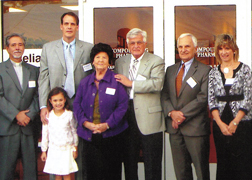Pacesetting pledge paves way for pharmacy lab
Carthan F. "Sonny" Currin Jr. (B.S. '59) has practiced pharmacy for more than 50 years. Today, as a compounding specialist, he's helping to fill a need for the future of compound pharmacy education and research at Virginia Commonwealth University by making a $50,000 pledge to his alma mater.
Just as personalized medicine serves patients based on their genetic profiles, prescription compounding provides medications not available in commercial form that are created for a patient's individual needs. Currin's gift supports the creation of a new compounding facility at the VCU School of Pharmacy.
"When this is done, VCU will be on the cutting edge," Currin said. "I think it's the best pharmacy school in America and a great representation for pharmacy in the state."
Currin knows a thing or two about compounding labs. He and his son, Chris (B.S. '95), opened Rx3 Pharmacy in Chester, Va., in 1995. It was the first accredited compounding pharmacy in the state. The practice of compounding is as old as pharmacy itself, with roots in ancient Greece. Though millions of prescriptions are compounded each year, many people are not familiar with the process.
"Compound pharmacists take different chemicals and combine them into a product via a prescription that is written by a physician and formulated for a specific patient," Currin explained.
The result is a personalized prescription for a specific patient with a specific need.
The School of Pharmacy's new $1 million, glass-walled lab will be located on the fifth floor of the renovated Smith Building and will feature 10 individual compounding stations and space for teaching, research and continuing education for alumni certification. Advanced electives will be offered to students interested in developing a specialty in compounding and sterile and nonsterile product techniques. Plans are expected to be complete by the end of this year with construction to begin in 2015.
When Currin relocated Rx3 Pharmacy to a larger space in 2009, he invited Victor A. Yanchick, Ph.D., dean of the VCU School of Pharmacy, to the grand opening.
The two discussed the growth of compounding and the entrepreneurial benefits of the practice.
Yanchick began to imagine the possibilities that adding a more sophisticated compounding program would bring for the school and the profession. He hopes not only to train students but also to offer practicing pharmacists the opportunity to return to campus to sharpen their skills and to prepare for compounding accreditation. The research component, he explained, will differentiate VCU's pharmacy program from others across the country.
"The new lab will be a training facility and will cover the entire spectrum of compounding," he said. "All schools teach basic compounding where students learn to make ointments, solutions or suppositories, but not to the extent that we can look at the product that we have compounded in terms of stability, effectiveness and potency."
Yanchick appreciates Currin's generosity and leadership with the project.
"It's important because I think pharmacists today are going to survive through entrepreneurial activities such as this. We are always looking for ways to improve health care," he said. "Compounding provides an added dimension that will be more important as we become more advanced in our knowledge of drugs and disease, especially from a personalized medicine point of view."
To learn more about the compounding lab or to make a gift to the School of Pharmacy, contact Ellen Leverich, director of development, at (804) 828-3016 or emleverich@vcu.edu.
